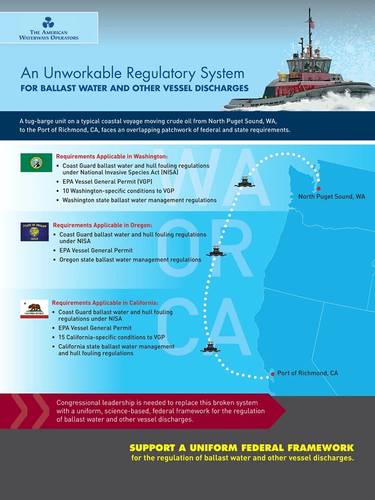Allegretti Testifies on Vessel Discharge Regs
Vessel operators press for uniform national vessel discharge regulation
On March 4, in testimony before the Coast Guard Maritime Transportation Subcommittee of the House Transportation and Infrastructure Committee, Tom Allegretti, President & CEO of The American Waterways Operators, urged Congress to enact a uniform national standard for ballast water and other vessel discharges to end a patchwork of federal and state regulations that is counterproductive to enhanced environmental protection, confusing and costly for vessel owners, and inefficient for state and federal agencies.
“Congress has an opportunity to enact legislation that improves the efficiency and effectiveness of marine transportation while enhancing the protection of our nation’s waterways,” Allegretti stated. “The establishment of a uniform federal framework for the regulation of vessel discharges will be good for the maritime industry and the men and women who work in it, good for shippers who rely upon marine transportation, good for the marine environment, and good for the American taxpayer.”
Allegretti emphasized that industry’s intent was not to avoid high standards, stating that “our industry has established a strong and continuously improving environmental record and we recognize that making responsible environmental practice a top priority is both good policy and good business. The problem is not that vessel discharges are regulated; it is how they are regulated.”
Allegretti shared the challenging compliance burden vessel operators and mariners face, with two federal agencies, the U.S. Coast Guard and the Environmental Protection Agency, and 25 states all regulating the same vessel discharges in overlapping and sometimes inconsistent ways. A tug-barge unit moving oil from Washington State to the Port of Richmond, California, for example, must comply with Coast Guard ballast water and hull fouling regulations, theEPA Vessel General Permit, 25 state-specific VGP conditions added by Washington and California, and ballast water management and reporting requirements imposed by Washington, Oregon and California.
Noting that a consensus among the scientific community as well as federal and state regulators regarding the capability of ballast water treatment technology has emerged in recent years and could serve as the foundation for bipartisan Congressional action, Allegretti urged the Subcommittee to end the current climate of uncertainty by “enacting a single set of uniform national standards, with a requirement for the standards to become increasingly stringent as treatment technology improves over time.”
“The broken regulatory regime for vessel discharges is not a problem of EPA’s making. It is not a problem of the Coast Guard’s making. It is a situation in which well-meaning and hard-working agencies have been effectively set up to fail as they seek to harmonize regulations promulgated pursuant to different statutory authorities,” Allegretti said. “Congressional leadership is badly needed to fix this unacceptable situation.”
americanwaterways.com




















